Have you ever wondered about navigating the personal injury claim process? Are you ready to tackle the details of getting compensated for your injuries? This guide will walk you through each step of a personal injury claim. From immediate actions after an accident to court and possibly appealing. You will learn important tips and expert advice that will help you on your journey.
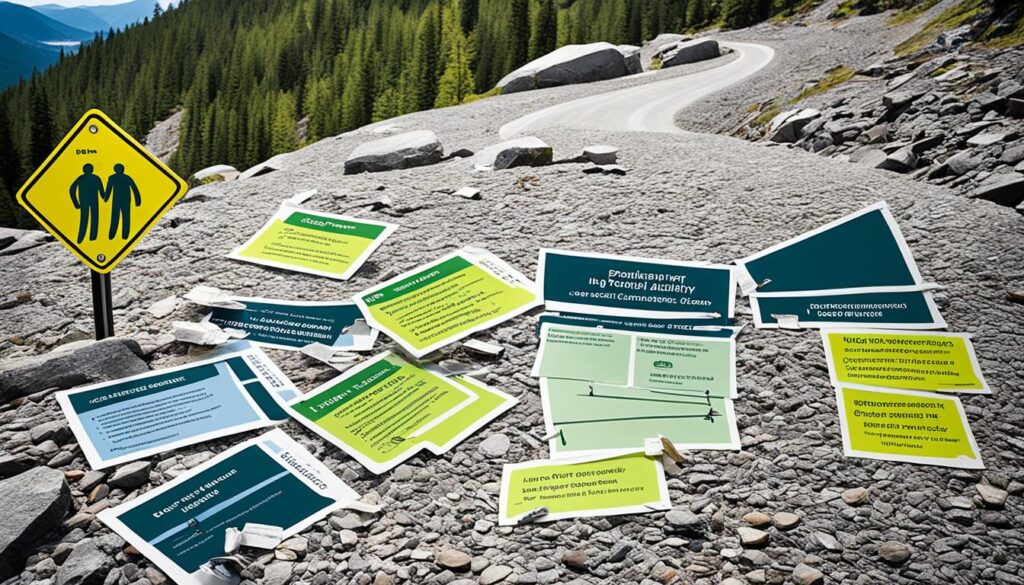
Key Takeaways:
- Understanding the personal injury claim process is essential for a successful resolution
- Immediate actions after an accident can significantly impact the outcome of your claim
- Seeking proper medical care and documenting your injuries are crucial steps
- Hiring an experienced personal injury lawyer can provide invaluable guidance
- Negotiating a fair settlement or filing a lawsuit may be necessary for your case
Immediate Actions After an Accident
Right after an accident, quick actions are key for your personal injury claim. Here are the vital steps you should take:
- Assess Injuries and Seek Medical Attention: First, your health comes first. Look for any injuries on yourself and others. If needed, call for an ambulance or get medical help fast. Your well-being should always come first.
- Gather Information: It’s important to gather details about the accident for your claim. Snap pictures of the scene, including any vehicle or property damage, visible injuries, and factors like weather or road conditions. If you can, also get statements from witnesses.
- File a Written Report: You’ll need to make a written report for certain types of accidents. For car accidents, call the cops and file a report. In a store or public place, tell the management and make sure they file a report too. These reports are key for your claim.
Remember, the actions you take right after an accident greatly affect your claim. By quickly checking for injuries, collecting info, and making reports, you’re building a solid case.
Next, in Section 3, we’ll go over why getting medical care after an accident is so crucial for your claim.
Seeking Medical Care
After an accident, it’s key to get medical help right away. Even if you feel okay at first, some injuries might not show up immediately. They could appear hours or even days later. It’s crucial to get checked again to ensure you’re okay and to document any injuries.
Medical records are essential when filing a personal injury claim. They prove your injuries and their effect on your health. When getting medical care, tell your doctor all your symptoms and details about the accident. The better your records, the stronger your case. Following treatment plans and going to all appointments is vital for recovery.
Experts in personal injury can offer valuable advice and care. They assess your injuries, might suggest seeing specialists, and create a treatment plan just for you. These professionals also give opinions on long-term effects, which can change the value of your claim.
Medical Care Checklist
- Seek immediate medical care after an accident, even if you feel fine initially**.
- Communicate all physical problems to your healthcare provider**.
- Follow any recommended treatments and attend follow-up appointments**.
- Consult with healthcare professionals experienced in personal injury cases.
- Keep detailed records of all medical visits, treatments, and prescriptions.
“Obtaining prompt medical care not only protects your well-being but also strengthens your personal injury claim by providing tangible evidence of injuries sustained.” – Dr. Emily Rodriguez, Personal Injury Specialist
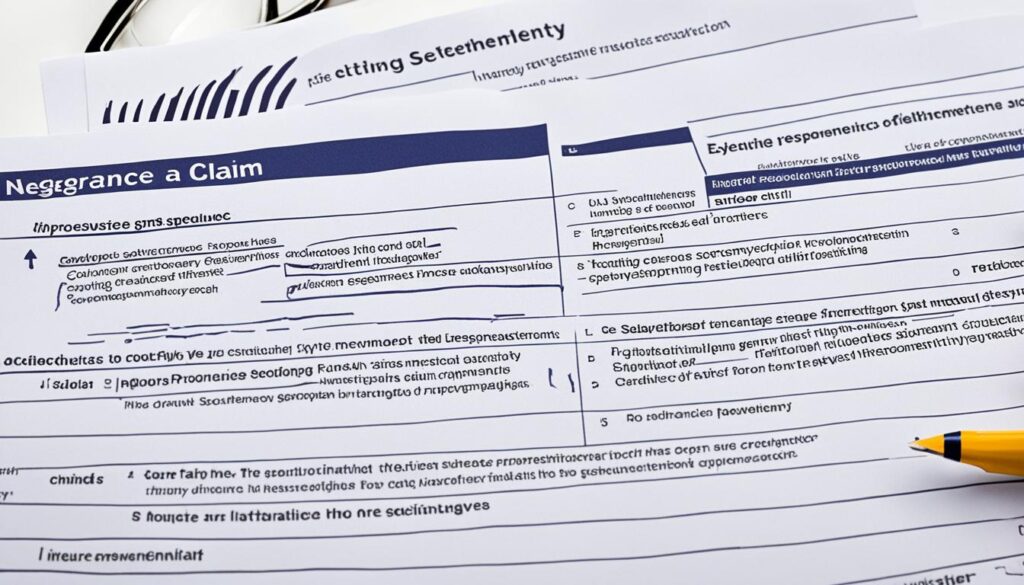
| Benefits of Seeking Medical Care | Consequences of Delaying Medical Care |
|---|---|
|
|
Hiring a Personal Injury Lawyer
Hiring an experienced personal injury lawyer is vital in the personal injury claim process. While you are healing from your injuries, a skilled attorney provides support and guidance.
Why is hiring a personal injury lawyer crucial?
An attorney with a focus on personal injury can look into your case deeply. They use their knowledge to ensure you get fair compensation. This process can be complex, but they know how to navigate it.
Why does it matter to have a personal injury lawyer? Here are the key reasons:
- Expertise and Experience: A personal injury lawyer knows a lot about personal injury laws. They’ve dealt with similar cases and will create a strong claim for you.
- Case Evaluation: Lawyers can understand the strong and weak points of your case. They help you see what you might face ahead.
- Negotiation Skills: These lawyers are great at talking terms. They can deal with insurance companies or other legal teams to ensure a fair settlement for you.
- Legal Guidance: Your attorney will guide you, sharing your rights and options as you go.
- Gathering Evidence: A good personal injury lawyer knows what evidence will make your case strong. They collect important records to help your claim.
- Peace of Mind: Knowing a professional is handling your legal matters allows you to focus on getting better.
“An experienced personal injury lawyer can evaluate your case, ensure fair compensation, and provide guidance throughout the process.”
To find the right personal injury lawyer, research is key. Look for an attorney who has succeeded in personal injury cases before. They should have happy clients and a strong reputation in law.
Making the right attorney choice greatly affects your claim’s outcome. Invest time to find someone who will represent and fight for you best.

Choosing the Right Personal Injury Lawyer
Keep these tips in mind when picking a personal injury lawyer:
- Get suggestions from those you trust who’ve hired personal injury lawyers.
- Look up lawyers online, read reviews, and client feedback.
- Talk to several lawyers to understand their approach and skill.
- Inquire about how they charge. Prefer ones who charge only if you win.
- Make sure they listen and understand your situation well.
By taking these steps, you ensure you have a skilled lawyer for your claim. This gives you confidence and peace as they work on your behalf.
Negotiating a Settlement
Before going to court, a lawyer might try to reach a settlement for the injured person. This is part of the personal injury claim settlement process. It aims to find a mutual agreement and avoid court. Settling can lead to a quicker solution and less uncertainty than a trial.
Knowing the ins and outs of the personal injury claim is key during negotiations. The personal injury claim evaluation tips assist in figuring out the claim’s worth. They take into account factors like:
- How serious the injuries are
- The financial loss from medical bills and not being able to work
- Who was at fault in the accident
- How the injuries have changed the person’s life for the worse
An attorney can negotiate better if they know the strengths and weaknesses of the case. This helps them argue for a fair settlement.
Understanding the Negotiation Process
During negotiations, both sides and their lawyers will talk things out. They’ll use evidence and arguments to support their demands. The aim is to agree on a settlement that fairly covers the injured person’s losses.
A skilled personal injury lawyer will fight for their client’s interests. They’ll use strong arguments, evidence, and negotiation tactics. They might also emphasize the costs and risks of a trial to get a good settlement.
Signing a Release Form
It’s vital not to sign a release form too soon. Doing so means giving up the right to ask for more money later. Always talk to an attorney first to ensure you’re truly compensated for all damages, now and in the future.
Being open and reasonable during the negotiation can lead to success. Good negotiation skills can secure the funds needed for medical care and getting better.
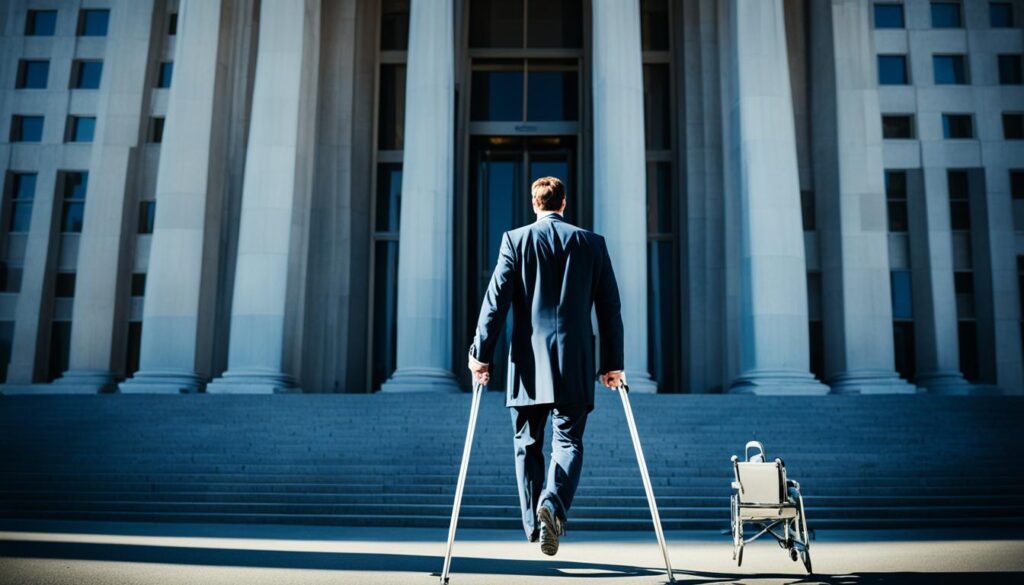
| Advantages of Negotiating a Settlement | Disadvantages of Negotiating a Settlement |
|---|---|
| 1. Faster resolution compared to going to trial | 1. Potential for a lower settlement amount compared to a court verdict |
| 2. Avoidance of court costs and lengthy litigation | 2. The possibility of unsuccessful negotiation and the need to pursue further legal action |
| 3. Control over the outcome, as parties have a say in the settlement terms | 3. The potential for confidentiality agreements that restrict discussing the case publicly |
| 4. Reduced emotional and mental stress associated with a trial | 4. The need to compromise and potentially accept less than desired compensation |
Filing a Lawsuit
If your personal injury claim doesn’t settle outside of court, you may have to file a lawsuit. This step is a formal legal action in court. It aims to get you compensation for your injuries and losses.
To start a lawsuit, there are specific steps and legal rules to follow. Firstly, you have to write a legal paper called a complaint. This document lists your injuries, how much damage you suffered, and who you think is at fault. It also explains how they were negligent or did wrong.
After writing the complaint, it needs to be given to all the defendants. This is done by sending them the complaint and a summons. The summons tells them about the lawsuit and gives them time to answer. This ensures everyone knows about the court case and can prepare their defense.
It’s important to know the statutes of limitation in your area. These laws set the deadline for filing a lawsuit. For example, in Florida, you have four years from the injury date. If you wait too long, your case might be thrown out.
Getting help from an experienced personal injury lawyer is very helpful. They can guide you, make sure all your paperwork is correct and on time, and stand up for you in court. They’ll work hard to make your case strong, gather evidence, talk to witnesses, and fight for the compensation you deserve.
“Filing a lawsuit is a crucial step in seeking justice and fair compensation for personal injuries. It is essential to have legal representation to navigate the complex legal process and protect your rights.” – [Attorney Name]
Important Steps in Filing a Lawsuit:
- Draft a complaint outlining your claims, injuries, and damages.
- Serve the complaint and summons to all defendants involved in the case.
- Be aware of the statutes of limitation and file within the specified timeframe.
- Consult with a personal injury attorney for guidance and representation.

| Benefits of Filing a Lawsuit | Considerations When Filing a Lawsuit |
|---|---|
|
|
Going to Court
Before a trial starts, depositions are a key step in personal injury claims. Lawyers, witnesses, and court reporters gather to take part. Everyone must speak the truth and ask for clarification if needed. Sometimes, other witnesses and experts also give their testimonies to help the case.
Getting ready for trial means knowing the Tampa courthouses well, especially for personal injury plaintiffs. Learning how the court works helps reduce stress. It makes appearing in front of a judge and jury smoother.
Being prepared is essential for a court visit for a personal injury case. Lawyers need to know the case details, like evidence and legal arguments. They should also know what experts to bring forward. Plaintiffs must be ready for tough questions and how to handle surprises during the trial.
What is shared in court is key to a personal injury claim’s success. Presenting facts, evidence, and experts’ views well can make a case stronger. This increases the chance of a good verdict.
| Benefits of Going to Court for a Personal Injury Claim |
|---|
| Opportunity to present evidence and arguments in a formal legal setting |
| Potential for a higher settlement offer during pre-trial negotiations |
| Ability to hold the responsible party accountable for their actions |
| Possibility of receiving compensatory damages for medical expenses, lost wages, pain, and suffering |
| A fair and just resolution to the personal injury claim |

Going to court can be intimidating, but proper preparation and help from skilled attorneys can ease the process. Each case is different, and outcomes hinge on the evidence and specific details presented.
Filing an Appeal
If your personal injury claim did not succeed, you might be able to appeal. Knowing how to proceed is essential.
To start an appeal, be aware of the court’s deadlines. Failing to meet them might mean you cannot appeal. It is best to work with a knowledgeable personal injury lawyer for advice.
The appeal begins by submitting a brief to the court.
This document explains your legal reasons for the appeal. Your lawyer will point out trial mistakes that could have changed the outcome.
After the brief is in, the court looks at it and the trial’s details. They make their choice after carefully checking everything.
Remember, an appeal doesn’t always change the result. But it does let a higher court reconsider and maybe change the decision.
Keeping in touch with your lawyer during the appeal is key. They help you understand each step and update you on progress. Their skill can greatly improve your chances of winning the appeal.
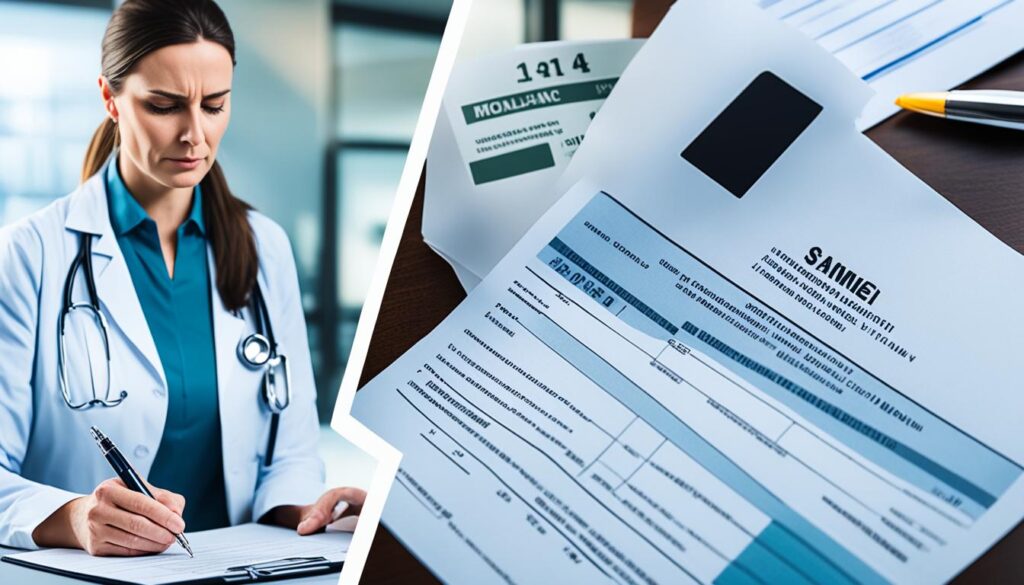
Key Steps in Filing an Appeal
| Step | Description |
|---|---|
| 1 | Adhere to the court’s time limits for filing an appeal |
| 2 | Consult with an experienced personal injury attorney |
| 3 | Prepare and submit a brief to the court outlining legal arguments |
| 4 | Court reviews the appeal and evaluates the arguments made |
| 5 | Maintain open communication with your attorney throughout the appeals process |
Following the right steps and getting a lawyer’s help allows for thorough review by a higher court in the appeals process.
Steps to Take Before Filing a Personal Injury Claim
Before you file a personal injury claim, certain steps are crucial. These steps ensure a smooth, successful process. They include gathering evidence and consulting a lawyer.
Right after an accident, try to collect as much evidence as you can. This should include photos of the scene and witness statements. With more evidence, your personal injury claim becomes stronger.
Getting immediate medical attention is also a key step. Even minor injuries should be checked by a doctor. This is because medical records are key evidence for your claim.
It’s wise to talk to a personal injury lawyer before you start your claim. They can offer valuable advice and check how strong your case is. They will make sure you follow the right legal steps.
Don’t forget to start collecting evidence early. This means getting your accident reports, medical bills, and any proof of lost earnings. These documents are important to support your claim and prove your losses.
By taking these steps, you will build a strong foundation for your claim. Being prepared improves your chances to receive the compensation you deserve.
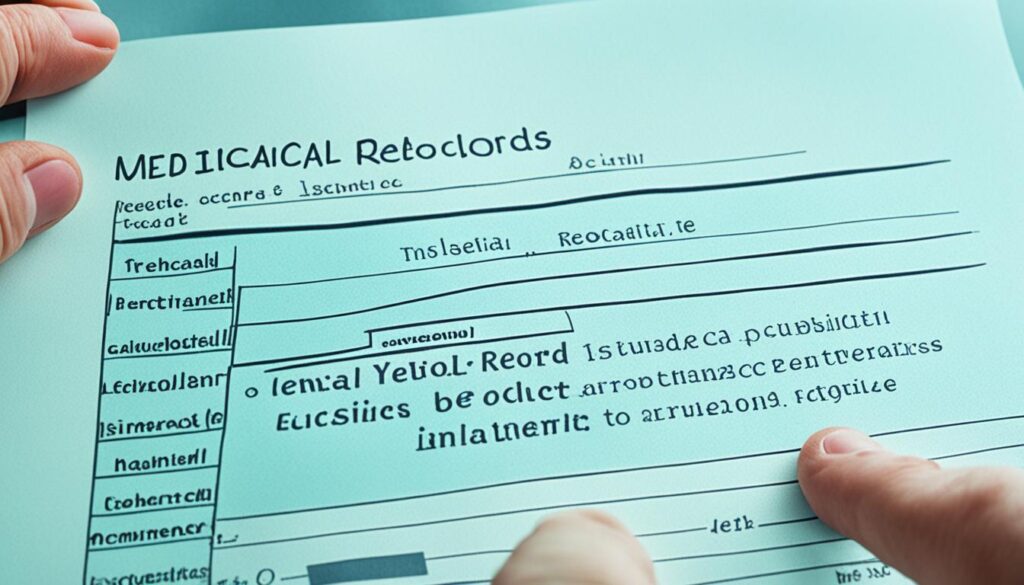
| Steps to Take Before Filing a Personal Injury Claim: |
|---|
| Gather evidence at the accident scene |
| Seek immediate medical care |
| Consult with a personal injury lawyer |
| Start the process of evidence collection |
Filing a Personal Injury Lawsuit
When you can’t settle out of court, you might have to file a lawsuit to get compensated. Filing a lawsuit means you’re officially asking for damages for your injuries and losses. It’s very important to follow the steps – from filing a complaint to serving the defendant – correctly.
Filing a Complaint
Before you sue, you must write and file a formal complaint. This document explains your case, who it involves, how the accident happened, and what you lost or were hurt from it. Your complaint should have clear and detailed information so your claim is strong.
Serving the Defendant
After filing your complaint, the next step is to make sure the defendant gets a copy. This is usually done by giving them the complaint and a summons. The summons tells them about the lawsuit and what they must do next. Making sure they’re properly served means they can’t say they didn’t know about the suit.
Adhering to the Statute of Limitations
Every state has a deadline for when you can file a lawsuit, called the statute of limitations. Knowing this deadline is very important. If you file too late, your lawsuit might be thrown out. Make sure you file on time to keep your case alive.
| Step | Description |
|---|---|
| 1 | Gather all necessary documentation and evidence to support your case. |
| 2 | Prepare and file a complaint with the appropriate court, outlining the details of your case. |
| 3 | Ensure proper service of the complaint and summons to the defendant. |
| 4 | Adhere to the statute of limitations and file the lawsuit within the specified timeframe. |
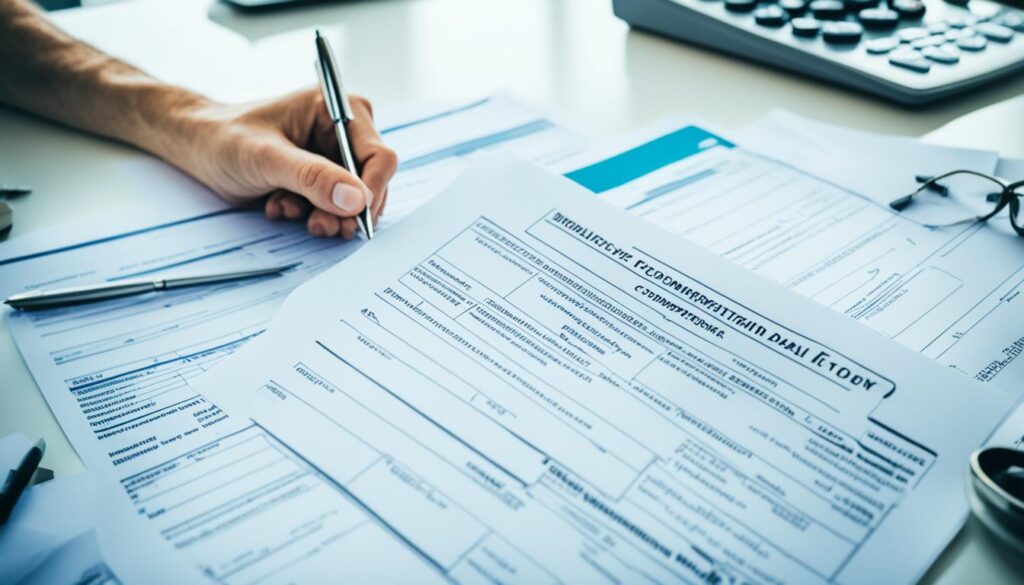
Settlement and Trial
After you file a lawsuit for your injury, talks about settlement may go on. The aim is to reach an agreement that covers your injuries and losses. If both sides cannot agree, the case might go to trial.
Getting ready for trial is key to winning. This means gathering evidence, knowing the court steps, and doing pre-trial discovery. Good preparation strengthens your case and improves winning chances.
At the trial, both sides will show their arguments and evidence. Witnesses, including experts, might be called to speak. The judge or jury will then think over the evidence and decide.
Your injury claim might end with a settlement or a court’s verdict. No matter the result, a good injury lawyer ensures your rights are safe. They help you get the compensation you deserve.